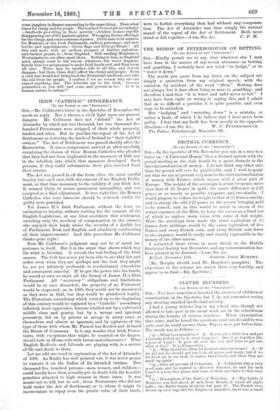IRISH " CATHOLIC " INTOLERANCE.
[To THE EDITOR OF THE "SPECTATOR."] SIR,—Mr. Colthurst's letter in the Spectator of November 9th needs no reply. But it throws a vivid light upon our present dangers. Mr. Colthurst does not " defend " the Act of Attainder by which not two thousand, but two thousand five hundred Protestants were stripped of their whole property, landed and other. But he justifies the repeal of the Act of Settlement as restoring the lands of Ireland to "their rightful -owners." The Act of Settlement was passed shortly after the Restoration. It was a compromise, arrived at after carefully examining the claims of those Roman Catholics who pleaded that they had not been implicated in the massacre of 1641, nor in the rebellion into which that massacre developed. Such persons, if they could substantiate their plea, received back their estates.
The Act was passed in all due form, after the most careful inquiry into each case, with the consent of the English Parlia- ment, at that time necessary to the validity of any Irish Act. It seemed likely to secure permanent tranquillity, and was accepted as a final adjustment. It was right that the Roman Catholics who were innocent should be relieved, whilst the guilty were punished.
Yet James II.'s Irish Parliament, without the least ex- amination or inquiry, without waiting for the consent of the English Legislature, at one blow overthrew this settlement, -awarding only the mockery of compensation to the owners, -who enjoyed their lands under the security of a double Act -of Parliament, Irish and English, and absolutely confiscating all their improvements! And this procedure Mr. Colthurst thinks quite right !
Now, Mr. Colthurst's judgment may not be of much im- portance in itself. But it is the straw that shows which way the wind is blowing. It reveals the real feeling of the Irish masses. The Celt has never yet been able to see that law and order, even when they are perhaps not the best they might be, are yet infinitely preferable to revolutionary convulsion and consequent anarchy. If he got the power into his hands, he would at once re-enact all the frenzy of James IL's Irish Parliament. All " statutory " obligations and limitations would be at once discarded ; the property of no Protestant would be respected ; as in 1689, they would not be massaered -as they were in 1641, but they would be plundered legally. The Protestant ascendency which existed up to the beginning -of this century would be replaced by a " Catholic " ascendency infinitely more oppressive, because wielded not by a cultivated middle class and gentry, but by a savage and ignorant peasantry, led on by priests as savage in many cases as themselves, and almost as ignorant, and by agitators of the type of those with whom Mr. Parnell has flooded and debased the House of Commons. Is it any wonder that Irish Protes- tants, with exceptions that might be counted on the fingers, should look on Home-rule with terror and abhorrence ? What English -Radicals and Liberals are playing with, is a matter of life and death to them.
Let me add one word in explanation of the Act of Attainder
of 1689. As Ranke has well pointed out, it was never meant to execute it on the bodies of its intended victims. Two thousand five hundred persons—men, women, and children- oould hardly have been actually put to death with the horrible penalties attached to high treason in those times. It was meant not to kill, but to rob ; those Protestants who did not hold under the Act of Settlement, or to whom it might be inconvenient to repay even the prairie value of their lands,
were to forfeit everything they had without any compensa- tion. The Act of Attainder was thus simply the natural sequel of the repeal of the Act of Settlement. Both must stand or fall together.—I am, Sir, &c., C. P. M.


















































 Previous page
Previous page